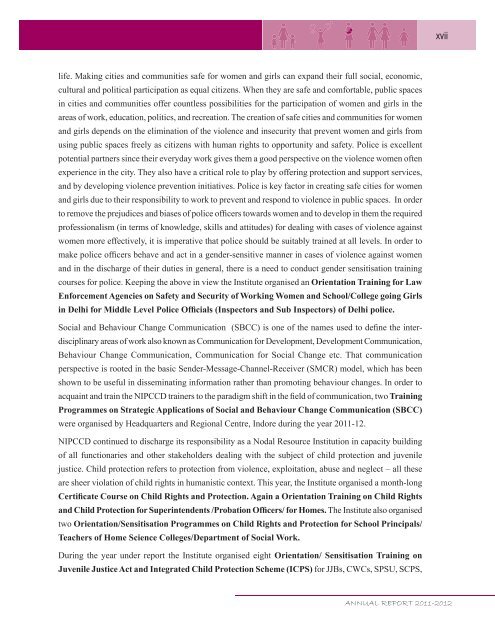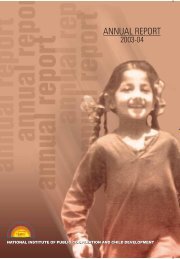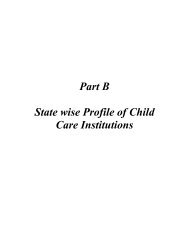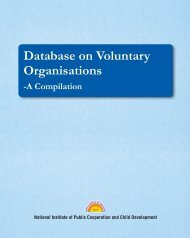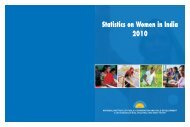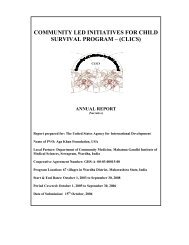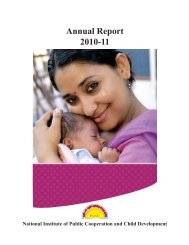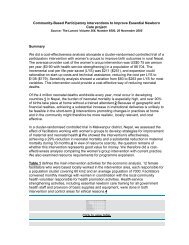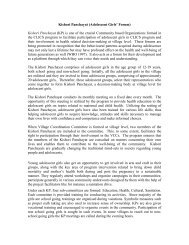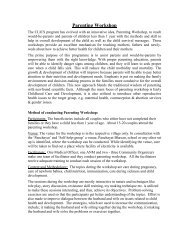From the Director's Desk - Nipccd
From the Director's Desk - Nipccd
From the Director's Desk - Nipccd
You also want an ePaper? Increase the reach of your titles
YUMPU automatically turns print PDFs into web optimized ePapers that Google loves.
life. Making cities and communities safe for women and girls can expand <strong>the</strong>ir full social, economic,<br />
cultural and political participation as equal citizens. When <strong>the</strong>y are safe and comfortable, public spaces<br />
in cities and communities offer countless possibilities for <strong>the</strong> participation of women and girls in <strong>the</strong><br />
areas of work, education, politics, and recreation. The creation of safe cities and communities for women<br />
and girls depends on <strong>the</strong> elimination of <strong>the</strong> violence and insecurity that prevent women and girls from<br />
using public spaces freely as citizens with human rights to opportunity and safety. Police is excellent<br />
potential partners since <strong>the</strong>ir everyday work gives <strong>the</strong>m a good perspective on <strong>the</strong> violence women often<br />
experience in <strong>the</strong> city. They also have a critical role to play by offering protection and support services,<br />
and by developing violence prevention initiatives. Police is key factor in creating safe cities for women<br />
and girls due to <strong>the</strong>ir responsibility to work to prevent and respond to violence in public spaces. In order<br />
to remove <strong>the</strong> prejudices and biases of police offi cers towards women and to develop in <strong>the</strong>m <strong>the</strong> required<br />
professionalism (in terms of knowledge, skills and attitudes) for dealing with cases of violence against<br />
women more effectively, it is imperative that police should be suitably trained at all levels. In order to<br />
make police offi cers behave and act in a gender-sensitive manner in cases of violence against women<br />
and in <strong>the</strong> discharge of <strong>the</strong>ir duties in general, <strong>the</strong>re is a need to conduct gender sensitisation training<br />
courses for police. Keeping <strong>the</strong> above in view <strong>the</strong> Institute organised an Orientation Training for Law<br />
Enforcement Agencies on Safety and Security of Working Women and School/College going Girls<br />
in Delhi for Middle Level Police Offi cials (Inspectors and Sub Inspectors) of Delhi police.<br />
Social and Behaviour Change Communication (SBCC) is one of <strong>the</strong> names used to defi ne <strong>the</strong> interdisciplinary<br />
areas of work also known as Communication for Development, Development Communication,<br />
Behaviour Change Communication, Communication for Social Change etc. That communication<br />
perspective is rooted in <strong>the</strong> basic Sender-Message-Channel-Receiver (SMCR) model, which has been<br />
shown to be useful in disseminating information ra<strong>the</strong>r than promoting behaviour changes. In order to<br />
acquaint and train <strong>the</strong> NIPCCD trainers to <strong>the</strong> paradigm shift in <strong>the</strong> fi eld of communication, two Training<br />
Programmes on Strategic Applications of Social and Behaviour Change Communication (SBCC)<br />
were organised by Headquarters and Regional Centre, Indore during <strong>the</strong> year 2011-12.<br />
NIPCCD continued to discharge its responsibility as a Nodal Resource Institution in capacity building<br />
of all functionaries and o<strong>the</strong>r stakeholders dealing with <strong>the</strong> subject of child protection and juvenile<br />
justice. Child protection refers to protection from violence, exploitation, abuse and neglect – all <strong>the</strong>se<br />
are sheer violation of child rights in humanistic context. This year, <strong>the</strong> Institute organised a month-long<br />
Certifi cate Course on Child Rights and Protection. Again a Orientation Training on Child Rights<br />
and Child Protection for Superintendents /Probation Offi cers/ for Homes. The Institute also organised<br />
two Orientation/Sensitisation Programmes on Child Rights and Protection for School Principals/<br />
Teachers of Home Science Colleges/Department of Social Work.<br />
During <strong>the</strong> year under report <strong>the</strong> Institute organised eight Orientation/ Sensitisation Training on<br />
Juvenile Justice Act and Integrated Child Protection Scheme (ICPS) for JJBs, CWCs, SPSU, SCPS,<br />
xvii<br />
ANNUAL REPORT 2011-2012


